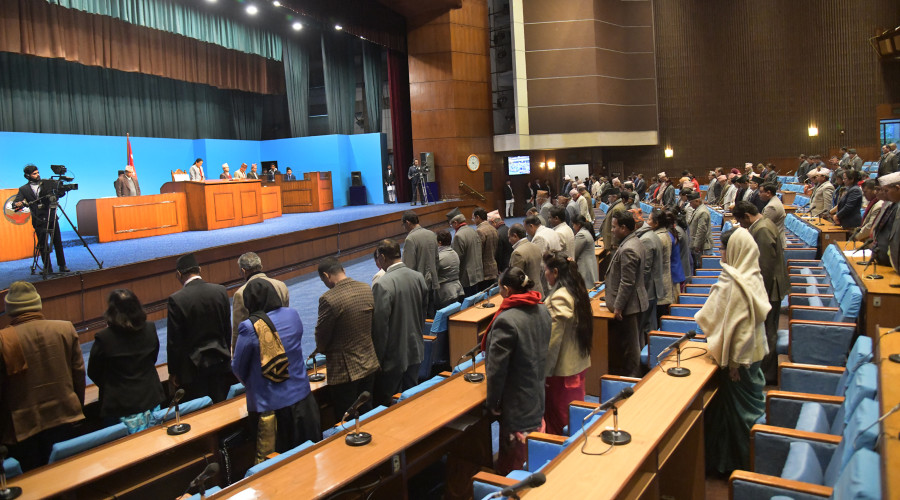Politics
Nepal’s political parties rarely encourage public participation in lawmaking
Citizens’ engagement in the formulation of laws not only ensures transparency but also enhances the quality of legislation, experts say.
Binod Ghimire
On September 17, 2018, the federal parliament suspended its rule that required 72 hours for lawmakers to study, and file amendments to, the bills related to fundamental rights. The 16 laws related to basic rights enshrined in the Constitution of Nepal were endorsed without proper deliberations in both the House of Representatives and the National Assembly, to meet the constitutional deadline.
The constitution made it mandatory that those laws should be in place within three years of its promulgation on September 20, 2015. The government, which showed no urgency for months, then presented the bills just a couple of days ahead of the constitutional deadline, leaving no time for deliberations on the bills in the Houses.
Legal experts and even parliamentarians had expressed their reservations about such hurried passage of bills. But the trend still continues. Experts say when parliamentarians are barely involved in formulating bills, chances of the members of the public having their say on lawmaking are just a far-fetched idea in Nepal, even though the House regulation demands that.
Rule 10 of the Lower House regulations envisions that people’s feedback could be necessary before parliamentary endorsement of the bills.
“There is hardly any constructive discussion [on the bills] in the House. Nor is there citizens’ engagement in the lawmaking process,” said Bipin Adhikari, a former dean at Kathmandu University School of Law and an expert on constitutional affairs.
It, however, is not only the problem of the government of the day. Nepal’s political parties actually treat citizens only as their vote base, showing little accountability to them.
Despite a well-placed provision, Nepali political parties in 2015 had rushed the constitution without collecting feedback from the members of the public.
Now the trend of ignoring public participation in lawmaking still continues. The KP Sharma Oli government over the past years has also drawn a lot of flak for failing to take the concerned agencies and stakeholders into confidence while preparing and introducing bills of public importance.
Proponents of media freedom and freedom of expression were forced to protest against the government for quietly introducing the Media Council Bill. and the Information Technology Bill. The Guthi Bill too had garnered a lot of criticism—even a huge protest in Kathmandu—following which the government withdrew it.
According to Adhikari, adequate discussion with the concerned stakeholders not only helps maintain transparency in legislative matters but also enhances the quality of laws.
“The engagement allows the sovereign people to have their say in the laws being drafted for them. This also increases their ownership,” said Adhikari. “A handful of people usually draft most of the laws in Nepal and neither experts nor citizens are engaged in the process.”
According to experts, after all, laws are made for the citizens. Laws are rules that bind all the people. They are not only meant for people’s general safety but also for ensuring the people’s rights as citizens and protecting the people against abuses by other people, organisations and even by the government itself.
According to experts, since the government itself can at times be a threat to the people and democracy, the legislation process requires public participation. In general, the public’s engagement is ensured by allowing ample time to those in Parliament who are actually people’s representatives.
“People, for whom the laws are made, must get a chance to have their say when they are formulated,” said Dinesh Tripathi, a senior advocate.
In mature democracies, there are instances where the judiciary has nullified the laws that were enforced without consultations, according to Adhikari.
In 2006, the Constitutional Court in South Africa held that two laws related to health were invalid because the provincial legislature failed to uphold its obligations to consult the public while drafting the laws.
In Nepal, however, there has been a practice of issuing whips to lawmakers when it comes to some crucial legislation. In such a scenario, parliamentarians often go by the party whip even if they have reservations on some issues.
“When a whip is issued, we are left with no option than to abide by the order,” said Sheikh Chand Tara, a lawmaker from the ruling Nepal Communist Party (NCP) who also served as the chairperson of the National Women Commission in the past.
“In case of a whip, there is hardly any chance for any lawmaker to defy the party order. When parliamentarians themselves are deprived of their right to debate, how can we expect public participation.”
Lawmakers from the opposition parties said the incumbent government has left little room for public participation in the legislation process as it has oftentimes kept even lawmakers in the dark.
“The Guthi Bill is one example. Had the government made consultations while drafting the bill, it would not have faced such a huge backlash,” said Bhimsen Das Pradhan, a Member of Parliament from the Nepali Congress, the primary opposition. “The government should have at least talked to lawmakers from the Valley to have a clear perspective on Guthi.”
Those lobbying for active participation of citizens in the lawmaking process say Parliament must come up with guidelines.
“We are also working on such a guideline,” said Shiva Bisankhe, director at the Nepal Law and Policy Centre, a non-government organisation that holds discussions on government bills and gives feedback to Parliament. “We want to present it to Parliament for the reference.”




 13.12°C Kathmandu
13.12°C Kathmandu














